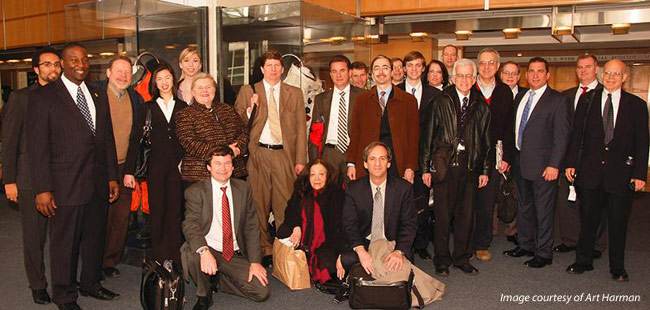From Ad Astra, Volume 24 Number 2, Summer 2011

By Kevin Simmons The Legislative Blitz is a grassroots event where laypeople from all walks of life and from around the country come to Washington, D.C. to meet with staffers from congressional offices and let our elected officials know of NSS’ support for our nation’s civil space program. No experience is necessary to participate in this event—anyone with a passion for space can join, and everyone is welcome. The Legislative Blitz is run under the banner of the Space Exploration Alliance (SEA), which is a partnership of more than a dozen nonprofit space advocacy organizations; but the SEA is led in this endeavor by the National Space Society, which organizes and runs the Blitz each year. As I walked into the conference room where the training session was about to begin, I was greeted by a scene of fellow space advocates ready to have their voices heard on Capitol Hill. First, we listened as Rick Zucker laid the groundwork. Zucker is executive vice president of the National Space Society, chair of the Blitz, a true space activist, and one of my favorite Bostonians. He introduced us to team assignments, itinerary, talking points, and advocate protocol. He showed us how to present a cohesive front, and to avoid divisive issues. He had scheduled almost 100 meetings for us over the course of two days. Then, two other speakers with experience on Capitol Hill dropped in to help us understand how to make an impact when speaking with representatives from the congressional offices. Since the SEA is comprised of 13 nonprofit space advocacy organizations, some of the ‘Blitzers’ might disagree about the finer points of our vision. However, our 2012 Blitz Talking Points provided a common ground by which we might vocalize our common goals. As with every Legislative Blitz, the mission is to educate, persuade, and serve as a resource as needed to Congress and the administration. This year, my team was comprised of four invested citizens: an engineer employed by a prime contractor, a former teacher and entrepreneur, a young engineer, and a former Air Force officer and engineer. Each of the four represented a different state and a different level in his or her careers. The opportunity to learn from one another and network with other passionate space enthusiasts made the Legislative Blitz very important to me. Before we went off to our meetings the next day, we had a policy briefing where the proposed 2013 budget for NASA was discussed in detail. We exchanged information and I learned some very interesting concepts from this discussion:
- U.S. spending on space is approximately equal to about three-fourths of the rest of the world’s spending on space.
- While many think the U.S. is ending its human spaceflight efforts, 56 percent of the proposed Fiscal Year 2013 budget is allocated for human spaceflight.
- Last year, 400 experiments were conducted on the ISS and there is a dedicated effort to increase its utilization.
- Though many speak of its demise, the science budget is approximately one-third of NASA’s total budget, and one-third of the science budget is tied up in launch costs.
- 85 percent of the U.S. launch market share has been lost in the last 15 years.
We discussed the need for a balanced and stable budget for Fiscal Year 2013 and beyond. We also discussed the major components of a welldeveloped U.S. space program, as outlined in our Blitz Talking Points, and in the National Space Society’s “Call to Action for American Leadership in Space.” In this year’s politically charged climate, it is very possible that a NASA budget will not pass, resulting in the use of continuing resolutions (CRs). CRs are inefficient funding mechanisms and will prevent some of the funding from being dedicated to truly important work. There will be NASA budget hearings on the Hill this spring, which made our visit critical and timely. Finally, we discussed the nature of NASA’s worldwide reputation as the leader in space, and the strategic value of NASA’s reputation to the nation. After a few group photos, we were off to the Hill. In most cases, we met with staffers at many levels within the offices, but some teams met with the actual member of the House or Senate. We found, as in years past, that staff’s experience with and knowledge of the American Space Program varied from staffer to staffer. Some were very well-versed from years of experience, but others—especially new staff members with just a few months of experience on the job—were not. As a result, every meeting was different. Some meetings focused on the high-level goals from the talking points, without going into too much detail. Some of the more invested staffers questioned us with direct and insightful questions. One of the most rewarding experiences of a ‘Blitzer’ is the opportunity to respond to an important question asked by a genuinely interested staffer. Most importantly, this is an opportunity to let our elected officials know what each of us feel is important. And since we are all volunteers, the pride and satisfaction we feel resonate with the staffers, as well. This was my third year, and I hope to be a ‘Blitzer’ for many years to come. I hope you will support the National Space Society in these efforts. Please join us for the 2013 Legislative Blitz to share in these experiences and make a difference for our future in space.







